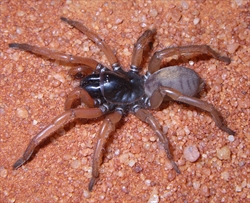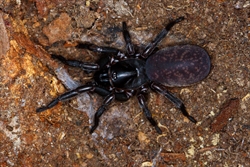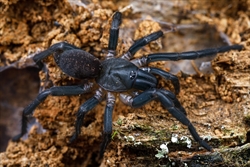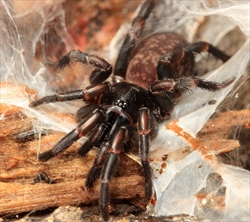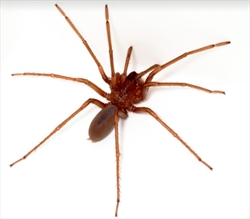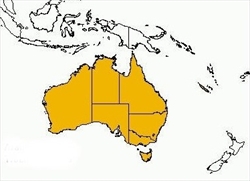Medium to extremely large (4–30mm or more) (Figs 1-5).
Fact Sheet
Anamidae: Anaminae
Northern Territory, Western Australia, Queensland, New South Wales, Victoria, South Australia, Tasmania, Australian Capital Territory (Fig. 6).
Tropical rainforest, swamp, temperate rainforest, open eucalyptus forest, semi-arid areas, desert.
Four. PLS segments equal in length; apical segment digitiform.
Caput of females gently raised, higher than thoracic portion (see Fig. 1); fovea of females more or less straight.
Eyes (see Figs 2-4) eight; group tiny, about 0.3 of headwidth; two rows; rows equal in width; on tubercle.
Chelicerae fangs longitudinal; retromargin without teeth; middle row of teeth distinct; intercheliceral tumescence in male absent; rastellum absent or with weak spines.
Maxillae longer than wide; anterior lobe small, indistinct; serrula absent; cuspules in female numerous, dense clustered at anterior inner corner or back onto heel.
Labium wider than long. Cuspules absent.
Sternum shield-shaped; with three pairs of sigilla.
Tarsi of females inflexible; preening combs on metatarsi absent; simple filiform trichobothria for length.
Claws: three; paired claws with two rows of teeth; third claw in female bare; with many hairs of different lengths below, lower claw sometimes not readily evident; tufts absent, or tufts immovable and extended as hairs from end of tarsi.
Scopula: in females, on tarsi and metatarsi (see Fig. 1).
Embolus originates straight off bulb or reflexes back close to it.
Aname, Chenistonia, Hesperonatalius, Kwonkan, Namea, Proshermacha, Pseudoteyl, Swolnepes, Teyl, Troglodiplura.

